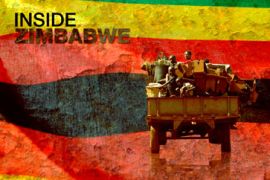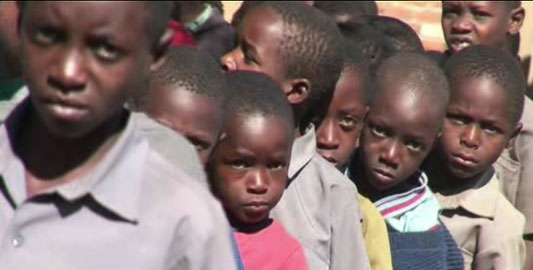On the brink of crisis
UN agencies are warning that one third of Zimbabwe’s population face starvation.

 |
| Parents in Zimbabwe can no longer afford to provide three meals a day for their children |
Agriculture is the mainstay of Zimbabwe’s economy but drought, a poor harvest and a controversial land reform programme have left millions at risk of starvation.
United Nations food agencies have estimated that more than one third of the country’s population face starvation but the government denies these claims.
Sweeping price cuts on basic goods and services have been announced, but few people expect these to solve the problem as people struggle with soaring inflation.
Al Jazeera’s Haru Mutasa visited Matabeleland where many families have harvested and could run out of food in a matter of weeks.
Lining up for food is an important part of the school curriculum in Zimbabwe. It is a rule that every child brings a plate every morning and a ration of porridge keeps their strength up.
Persistent drought and the worsening economic situation – inflation is 4,500 per cent and unemployment is more than 80 per cent – means parents can no longer afford to provide three meals a day.
Even though some children have to walk for more than an hour to reach school, attendance is always high.
Feeding programme
“This supplementary feeding programme helps them a lot because it actually reduces the consumption which is done at home,” Nqobile Matabiswana, a headmaster at a school in southern Matabeleland, told Al Jazeera.
| Facts and figures |
|
Unemployment: 80 per cent Life expectancy: 34 years for men and 37 years for women Inflation: 4,500 per cent and rising Exchange rate: One US dollar to 15,000 Zimbabwe dollars |
There were 222 children at his school and when we visited at around midday many of them were having their first meal.
The government disputes a UN report that says more than four million Zimbabweans will run out of food early next year calling it an exaggeration. It says 600,000 tonnes of maize have been imported to feed the people.
Angeline Masuku, the governor of Matebeleland South, told Al Jazeera: “There is not enough food for people from their fields. The government is actually supplementing the little that they have.
“There is not enough food but the good part of it is that nobody is going to die of hunger.”
But in a remote part of the country we saw how grim things had become. People are worried.
Desperation
In a final act of desperation, many villagers were trying again to grow something in the parched soil. It has not rained since April and fertilisers and pesticides are too expensive for people to buy.
| Al Jazeera exclusive | ||
|
|
“Last year was better. This year is really poor. We can’t even talk about it because we don’t have anything from the fields,” Maliwa Moyo told Al Jazeera.
Near the border with Botswana we stumbled across the Khoisan people. They did not even bother growing anything this year because it was too hot.
They told us they were hungry and had not received any food aid since March.
“We don’t know when we are going to get food. We used to get trucks moving from village with bags of maize. Now we don’t know if they are coming back,” Gwatawa Ndlovu said.
He said it broke his heart to know that he could not provide for his family, but along as he is alive he will never give up hope that things will get better.

